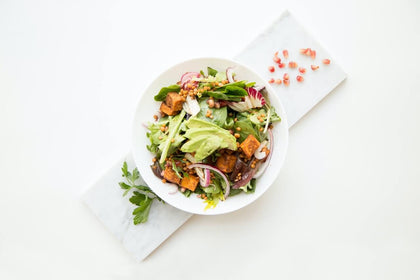If you follow the popular keto diet, you may be experiencing hair loss — not to worry. Yes, this is a possible side effect of the high-fat, low-carb diet, but there are several research-backed ways to promote healthy hair and avoid hair loss on keto. With a holistic approach to hair wellness, you can prevent hair loss while still enjoying the diet's weight loss benefits. Plus, find out what products you should use to combat thinning hair.
#include-related-slider#
What Is the Keto Diet?
The keto diet has been around since the 1920s and was originally and still is used as a treatment for epilepsy. More recently, slight adjustments made it into a popular diet that can deliver rapid weight loss. Instead of eating a typical American diet (50 percent or more of which is made up of carbohydrates), on the keto diet you eat mostly high-fat foods while moderating protein intake and restricting carbohydrates.
On a typical diet, carbohydrates convert to glucose in the body and then cells burn that glucose for energy. But, when the body gets a low-carb diet, it must start using ketones and fatty acids for fuel in a process called ketosis.
Shop: GRO More Kit
Why Do People Experience Hair Loss on the Keto Diet?
While the keto diet has proven to be an effective method for weight loss, it has a side effect you might not expect: hair loss.
There are a couple of causes of hair loss on the keto diet, most notably nutrient deficiencies and stress. Let's dive into each cause a bit further.
Learn: The Best DHT Blockers to Grow Hair and Reduce Hair Loss
Hair Loss Due to Missing Nutrients on a Ketogenic Diet
Hair is made of keratin, which is a protein. And while the keto diet encourages moderate protein consumption, it restricts many foods and entire food groups.
If you plan to follow a keto diet, you may find advice from sources to eliminate certain foods or drinks that are high in carbs, such as:
- Wheat-based products like whole grains
- Starches like breads, pasta and potatoes
- Fruit, with one exception: small portions of berries
- Beans and legumes
- Root vegetables
- Low-fat food products
- Unhealthy fats, including mayo and processed vegetable oils
- Certain condiments, such as barbecue sauce and ketchup
- Some sugar substitutes
- Sugary foods and drinks
- High-carb alcohol like beer, sugary cocktails and certain wines
Limiting calorie intake from some categories (like alcohol or sugary drinks) can be helpful with weight loss. However, restricting entire food groups like whole grains, vegetables and fruits means lowering the amount of nutrients in your diet, some of which are needed for healthy hair growth.
Also: Alcohol and Hair Loss — Is There a Connection?
Nutrients to Add to Your Diet to Avoid Keto Hair Loss
To avoid vitamin deficiency and improve hair health, make sure you get enough of these nutrients in your diet:
- Vitamin B3 (niacin): Fish and poultry are great sources of B3, while peanuts and mushrooms are good alternatives for a vegetarian diet.
- Vitamin B5 (pantothenic acid): Found in avocado, broccoli, cauliflower, kale, and mushrooms, B5 is easy to fit into your meal plan.
- Vitamin B7 (biotin): While vegetables like sweet potatoes and carrots are off the menu, try snacking on almonds or walnuts to avoid a biotin deficiency. If you can't get enough in your daily diet, consider biotin gummies, as well as biotin gummies with an advanced formula.
- Vitamin C: Instead of high-carb root vegetables or sugary citrus fruits, which may be reduced or eliminated from a ketogenic diet, try broccoli, kale, red or green peppers, tomatoes, or a small portion of strawberries.
The American Academy of Dermatology Association also names lack of protein or iron among nutrient deficiencies that can cause hair loss, as some keto dieters restrict protein intake in fear of it stalling their weight loss. Vegetarians, vegans or those restricting protein may face challenges getting enough of these nutrients on a low-carb diet. Instead of beans or legumes, you can eat keto-friendly foods that are high in protein such as almonds, artichokes, avocado, bok choy, broccoli, cauliflower and pumpkin seeds. It's also a good idea to add dark leafy greens like kale and spinach to your diet to avoid iron deficiency.
A low-carbohydrate, moderate-protein diet can still be rich in nutrients. Plan your meals carefully and you can enjoy the weight loss results of ketosis while minimizing side effects. And always consult your doctor before starting a diet.
Related: Best Foods to Eat for Healthy Hair Growth
Hair Loss Due to Stress on Ketogenic Diet
While the ketogenic diet is scientifically proven to aid in weight loss, it requires a significant adjustment for many people. These changes can shock the body, causing temporary hair loss. Telogen effluvium (TE) is a resting phase of the hair growth cycle that results in rapid hair loss as a response to shock. Nutritional deficiencies, sudden weight loss, and physical or psychological stress are all clinically proven causes of telogen effluvium. If you notice an increase in hair shedding and appear to have thinning hair, this could be a sign of TE. Fortunately, it often resolves in less than six months and can benefit from additional habits like applying a daily hair serum.
Read: How to Minimize Stress-Induced Hair Loss
Hair Loss Due to Calorie Restriction
To avoid longer-term hair loss, also make sure to eat enough calories. While this might not seem like a common diet challenge, the high-fat content on the keto diet makes dieters feel full. Dermatologists agree that drastic calorie restriction can result in less hair growth and excessive shedding. Simply put, fewer calories means less energy, and the body may choose not to use that limited energy on hair growth. If you experience hair loss in combination with rapid weight loss, consider increasing your calories to return your hair to a growth phase.
Learn: How Dieting & Weight Loss Impact Hair Loss
Can I Stop Hair Loss on the Keto Diet?
Great news! Yes, you can. By making adjustments to your personal care routine, you can reduce hair loss when dieting such as on keto. Here's how to stop keto diet hair loss:
1. Tweak Your Macros to Meet Your Needs
The standard keto diet gives guidelines for three macronutrients: low carbohydrates (5% of calories), moderate protein (20%), and high fat (75%). Some people use customized macros to meet their personal needs and goals, something you can do as well if your goal is to reduce hair loss while remaining on the ketogenic diet. By slightly increasing carbs and protein, you can reintroduce a variety of foods to your diet, like vegetables, beans, fruits or whole grains. With this comes nutrients and better hair health. But keep in mind drastic changes could move you out of ketosis.
Also: Can Too Much Exercise Cause Hair Loss?
2. Give Your Scalp the Attention it Deserves
According to research, scalp massages increase hair thickness and improve hair loss. How? The massage stretches hair follicle cells, stimulating the production of thicker hair. Using a scalp massager may also increase circulation beneath the skin to encourage hair growth. Just gently press the head massager to your scalp and move it in circular motions for a relaxing and revitalizing experience. You can do this on wet or dry hair, with or without product.
For growth and greater thickness, try our plant-based GRO+ Advanced Hair Serum. This new formula penetrates the outer layers of the scalp to reach the root of hair follicles. From there, natural ingredients circulate deeply to lengthen the hair growth cycle and build stronger, thicker looking hair. Pair the serum with a scalp massage for some extra self-care.
3. Get a Boost With Supplements
Make sure your hair gets the nutrients it desires with a nourishing supplement like biotin gummies for hair. It combines essential B vitamins and folic acid to stimulate new hair growth. Plus, vitamins A, C, and E and zinc promote scalp health, altogether resulting in fuller, thicker looking hair. And, unlike powdered collagen, this supplement is 100% vegan and gluten free.
Shop: Hair Wellness Products for Thicker, Fuller Looking Hair
4. Reduce Stress On Your Mind and Body
Starting a new diet can be challenging. But there are ways to reduce the stress on your mind and body. Be sure to:
- Get enough sleep. Aim for seven to eight hours per night.
- Drink plenty of water. Try water with electrolytes as these can be missing from a low-carb diet.
- Add salt. Low-carb diets mean low sodium. Replace it to avoid getting the keto flu.
- Be patient. It can take two to three weeks for ketosis to begin, according to the Mayo Clinic.
- Accept that the keto diet might not be for you. Losing hair may not be worth losing weight. If it's not working for you, accept it and talk to your doctor or nutritionist about other options.
5. Go Easy On Your Tresses
Minimize strain on your hair while adapting to the keto diet. Avoid heavy styling, heat styling and coloring your locks. And remember that pulling at your strands for tight updos or heat styling can loosen the hair follicles and cause hair loss.
#include-related-slider#
Get the Hair You Deserve
While the ketogenic diet can make hair fall out, don't lose hope. There are many ways to stop losing hair and to bring back lush locks. Support hair wellness with supplements that might be missing from your diet. Reduce stress with relaxing scalp massages. And boost growth with our GRO+ line. In a few weeks, you'll be enjoying gorgeous, healthy hair.
More From VEGAMOUR
- VEGAMOUR For Men
- Here's How Gut Health and Hair Loss Are Related
- 8 Stress-Reducing Yoga Poses for Hair Growth
- Juice Recipes for Hair Growth
Photo credit: Hermes Rivera/Unsplash
Back



















